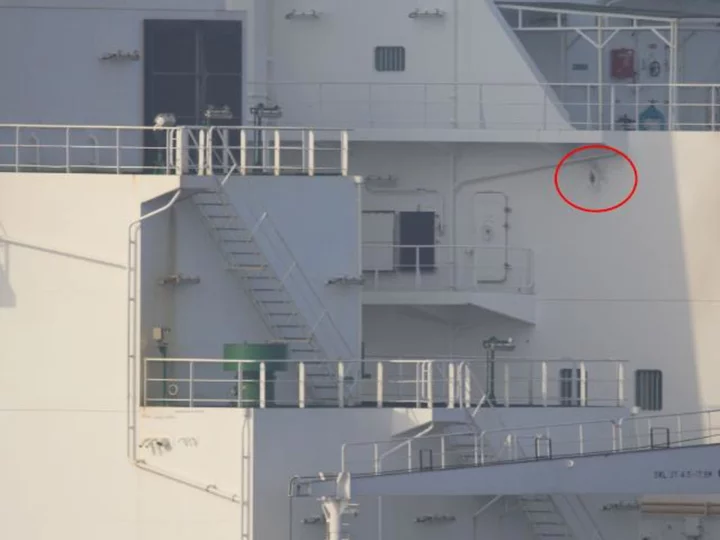The US Navy intervened to stop Iranian Navy ships attempting to seize two oil tankers in separate incidents in the Gulf of Oman early on Wednesday morning, according to a US defense official.
An Iranian ship opened fire at the tanker in the second seizure attempt, according to the official.
In the first incident, an Iranian Navy vessel approached the TRF Moss, a Marshall Islands-flagged oil tanker, in international waters in the Gulf of Oman at approximately 1 am local time, the official said. The tanker was through the Strait of Hormuz and heading toward the Arabian Sea when the Iranian vessel approached.
The Iranian ship had no reason to be there or approach the tanker except to attempt to seize it, the official said. A US Navy destroyer, along with maritime patrol aircraft, approached the ships to prevent the oil tanker being seized, the official said, at which point the Iranian vessel changed course and left the area.
But only a few hours later, a second Iranian Navy vessel approached a different oil tanker, the Richmond Voyager, which was in international waters approximately 20 nautical miles off-shore from Muscat, Oman. The tanker was also heading for the Arabian Sea and was even further away from Iranian waters than the first tanker.
As the Iranian ship neared the Richmond Voyager, the tanker issued a distress call, the US official said. The US Navy destroyer received the distress call and sailed at full speed to the scene, the official said. The Iranian ship had already hailed the oil tanker and was in the process of attempting to stop and board the ship when the US Navy destroyer drew closer.
Iranian personnel on board the Iranian Navy ship opened fire at the tanker with small arms, the US official said, hitting the side of the ship near crew living spaces. No one was injured on board the Richmond Voyager, the US official said, and the Iranian vessel left the scene as the US Navy destroyer approached.
The US Navy did not open fire during the incident, and no US personnel were injured.
"Our global presence allows us to act at a moment's notice to ensure the free-flow of commerce that fuels the world's economy," said Rear Adm. Ryan Perry, the Navy's chief of information. "This is why our Sailors operate everywhere international law allows, so everyone else can too."
According to the US Navy, Iran has harassed or seized nearly 20 internationally flagged commercial vessels since 2021 in what the Navy called a "clear threat to regional maritime security and the global economy."
Earlier this year, Iran seized two oil tankers in less than a week in the same region, a move that prompted the US to increase the rotation of ships and aircraft patrolling the Strait of Hormuz, a critical waterway in the Middle East through which a significant portion of the world's oil and natural gas transit.
On April 27, Iran's Navy seized the Advantage Sweet oil tanker after Iran claimed it collided with one of their boats and attempted to flee the scene, according to Iranian state news agency IRNA. Iran alleged that the tanker was trying to flee the scene, but the US Navy said the tanker was seized in international waters in the Gulf of Oman.
Only days later, Iran seized the oil tanker Niovi as it went through the Strait of Hormuz. About a dozen fast-attack ships from Iran's Islamic Revolutionary Guard Corps Navy swarmed the tanker and forced it to reverse course into Iranian territorial waters. The US Navy described the incident as an "unlawful seizure," while Iran's semi-official FARS news agency said the tanker had "apparently violated maritime law."
The series of incidents prompted the US and its partners to increase the rotations of ships and aircraft in the region to better deter threats to international shipping.









